 |
 |
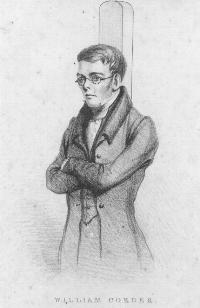 |
William Corder
William Corder was born in 1803, the third son of a yeoman farmer. He lived in Polstead near Stoke-by-Nayland, Suffolk. His father and three brothers all died within the space of eighteen months, leaving William and his mother to run the farm.
Corder was about 5ft 4 inches (163cm) tall, slender, well-muscled, with a fair complexion and freckles. He was very short-sighted, yet an excellent shot. In the best-authenticated likeness he looks rather studious. As a child he spent five years at a respectable boarding school at Hadleigh. Though bright, he was not well liked by his fellows. He was nicknamed 'Foxey', perhaps because he was given to stealing and lying. In Polstead he was generally known as 'Bill'. He did not get on well with his father or brothers, but was quite attached to his mother.
Despite the evidence of character witnesses at the trial that he was kind, humane and good-tempered, Corder is said to have been reserved, even churlish. He absorbed gossip and took pleasure in keeping the information to himself. He was never known to get drunk. He spent little, except on women. He obtained money by fraud on several occasions. His father despaired of him and tried to send him to sea. However because of Corder's poor eyesight, no one would employ him.
Bill Corder became involved with Maria Marten in about March 1826. They kept their relationship secret until Maria fell pregnant. Thereafter he was a constant visitor to the Marten's cottage.
His dishonest ways continued. He cashed a £5 cheque sent by the father of Thomas Henry (Maria's surviving child) for maintenance, but denied receiving the money. He also told Maria that there was a warrant out against her for having illegitimate children, but this was untrue. Although he often promised to marry Maria, he always found an excuse not to do so. Not long before the murder, he took up with a known criminal, 'Beauty' Smith, who often said that some day or another, Corder would hang.
After the murder Corder stayed in Polstead to run the farm. He always kept the key to the Red Barn to himself. When questioned, he told Maria's family that that she was well and staying with friends, and that he would marry her at Michaelmas. In late September 1827, after the harvest, Corder left Polstead 'for reasons of health'. While he was away he met a Miss Moore, who later replied to his newspaper advertisement for a wife. They married. At the time of his arrest the couple were running a school for girls in Ealing Road, Brentford. Even though Maria's bag was found in his possession, he denied knowing anyone called Maria Marten. |
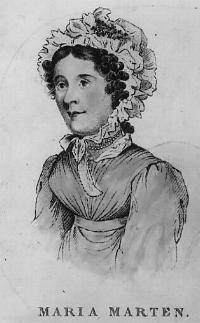 |
Maria Marten Maria Marten was born on 24th July 1801, the daughter of Polstead mole-catcher Thomas Marten and his first wife, Grace. She was a quiet and intelligent child. At an early age Maria was sent to live with a clergyman's family at Layham, where she helped in the nursery. She would also have received an education. Unusually for a country girl at that time, Maria could read and write well. Just after Maria's 9th birthday, her mother died. The girl had to return to her father's cottage to look after her younger brothers and sisters. She took her role of 'mother' seriously and was admired by all who knew her. As well as attending to her household duties, she seems to have continued to educate herself. Curtis commented "Having been blessed with a very retentive memory, and her mind deeply embued with a desire to acquire useful knowledge, there is every reason to believe that, if she had received proper tuition, she would have made an accomplished woman." [Curtis, 1828, p.41] Maria grew up to be a pleasant, trusting and good-looking young woman. She may also have had ambitions to better herself through marriage. Certainly, she seems to have attracted a number of wealthy young men. |
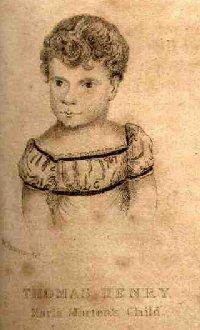 |
At the age of 17, Maria became involved with Thomas Corder, William's second oldest brother. The respectable son of a wealthy farmer, Thomas was a passably good-looking young man. He visited her frequently at the cottage. At Thomas' wish their courtship
was largely carried out in secret: Maria was not his equal in social status. Thomas fathered Maria's first child, but his visits became increasingly infrequent as her pregnancy progressed. He did not marry her, and provided little financial support. The child died young. Maria, now a 'fallen woman', next had an affair with a certain Peter Matthews, a well-respected gentleman with relatives in Polstead. He was aware of her past. By him she had a son, Thomas Henry, the only one of her children to survive. Again, there was no marriage. However, Matthews provided a regular allowance for the upkeep of his child. Maria next took up with William Corder. His father and brothers were dead. He was wealthy. He was young. He would have made a good catch. She seems to have loved him. She pressed him to marry her. William's mother disapproved of the relationship. Corder often promised marriage but always found an excuse to delay the wedding. By Corder Maria had a third child , but it was weak and died within a month. The pair pretended to take it to Sudbury for burial, but probably buried it in the fields. Six weeks after the birth, Maria disappeared. Her anxiety to marry had sealed her fate. Two months short of her 26th birthday, Maria was dead. Maria's Family |
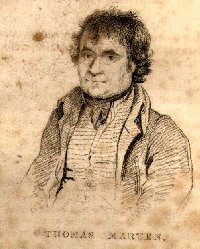 |
Thomas Marten Maria's father, Thomas Marten, was a mole catcher. He was, according to Curtis, "of the superior class of agricultural labourers... much respected by his superiors for his moral conduct and simplicity of manners". He had several children by his first wife, Grace. After her death, Thomas remarried. His second wife, Ann, bore him at least three more children. At the time Maria was murdered, she and her full sister, also called Ann, were still living at home.
Mrs Marten It has been suggested that Ann Marten may have known about the murder, and possibly had some part in it. Rumour had it that she was involved with Corder, that Maria was causing them problems and was murdered to get rid of her. Some believe that Mrs. Marten invented the story of the dream to ease her guilty conscience without implicating herself. There is no extant evidence to confirm the truth of these allegations. |
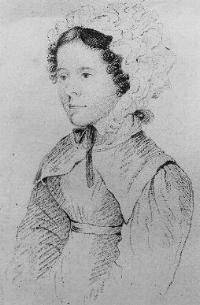 |
Ann Marten Maria and her sister (also called Ann but known as Nancy) seem to have been close. Ann identifed the body at the inquest, and gave evidence in court. She was said to be very like Maria, and was the model for the drawing of Maria printed in Curtis' account of the murder.
George Marten
Curtis records several examples of Corder's dishonesty. On one occasion William Corder asked an acquaintance of the family to lend his father a £10 note. Some time later, the man met the elder Corder, and reminded him of the loan. Corder senior, who knew nothing about the matter, was much surprised. He repaid the loan, commenting that he did not know what to do with the boy. William was chastised, but to little effect: he "continued his depredations upon his father's property, and squandered the proceeds among females with whom he had become acquainted," (Curtis , p.78) though in other respects he was not extravagant. On another occasion, Corder's father sold some pigs to a man called Baalham. The following week William sold Baalham several more, passing them off as his own. When Mr. Corder discovered that Baalham had taken more of his pigs, he demanded their return, implying that they had been stolen. Baalham, who had bought the animals in good faith, would not part with them unless his money were refunded. Eventually, after much unpleasantness, the truth came out. Mr. Corder got his pigs back, but was obliged to pay for them. Shortly before Maria Marten's murder, Samuel Smith returned to the village of Polstead. Smith, alias Cooper, commonly known as 'Beauty' Smith, was a notorious thief. He had been in prison for several minor offences and transported twice for pig stealing. Corder took up with Smith. One night they went together to a nearby village to steal a pig, which Corder later killed. Quizzed about the incident by Ayres, the local constable, Smith reportedly replied "I'll be d....d if he (Corder) will not be hung (sic) some of these days."
Curtis recounts the following as an example of one of Corder's fraudulent dealings. A CHARGE OF FORGERY
Hearing the prisoner was in Colchester, Mr. Taylor, the chief-clerk at the banking house of Messrs. Alexander and Co., at Manningtree, accompanied by Mr. Dale, the proprietor of the White Hart Inn, opposite the bank, arrived in a chaise at the George Inn. Upon their being introduced to the room where Corder was sitting, they both immediately recognised him as being the person who had obtained 93/ [£93] from the above bank, upon a forged check. The following are the circumstances under which the check was presented and cashed, for the knowledge of which we are indebted to Mr. T------ - :--
"On Monday, the 14th of April, a person known by informant and Mr. Dale to be the prisoner, arrived at the White Hart Inn, at Manningtree, which is kept by the latter gentleman, and whose house is opposite the Bank, in which informant is principal clerk, and he said that he had a check which he wished to get cashed. Mr. Dale told him he was too early, as the Bank was not open; but if his business required haste he would speak to informant to expedite it. Lea, the officer, was present when a statement similar to this was made by Mr. T-------; and he recollected that, after he had searched the house at Brentford, the prisoner asked him whether he had found 80 sovereigns in the drawer of the writing desk. He declared that he had made no such discovery, upon which the prisoner said, "then I dare say my wife has taken them out." After this Mrs. Corder came to the Red Lion, at Brentford, and acknowledged that she had taken out twenty sovereigns, which she placed in the prisoner's hands. Curtis, James: The Mysterious Murder of Maria Marten; William Clowes, Stamford-Street, London, 1828, pp.18-21 Another example of Corder's dishonesty was the matter of the £5 note. The father of Thomas Henry, Maria's only surviving child, had sent a quarterly payment for his son's upkeep to Maria in a letter. It did not arrive. Thinking it had not been sent, Maria contacted the father, who made enquiries at the post office. It turned out that his letter and passed through the hands of a man called Corder. Together with a solicitor, the Colchester post-mistress, Miss Savage, visited the Corder house to make enquiries. William, who was at home, denied any knowledge of the money. His older brother John knew nothing, nor did his mother. Further enquiries were made. The note had been endorsed at a bank in Hadleigh in the name of James Corder. Investigations revealed that this was an error on the bank's part: it was the very short-sighted Corder brother - William - who had presented the note. The clerk had mistakenly thought he was called James, which was the name of the younger brother. William then visited the bank in person, haughtily accusing them of bringing his name into disrepute. He was firmly told that the clerk would swear, on oath if necessary, that the person who had presented the note was William himself. Thus thwarted, William then forced Maria to lie and say that she had received the money. The next time Thomas Henry's father sent a remittance (which was not long before Maria's disappearance) he only sent half the banknote. Maria had to acknowledge its receipt in writing before he would send the other half. Curtis, James: The Mysterious Murder of Maria Marten; William Clowes, Stamford-Street, London, 1828, pp.45-48.
Extract from Curtis's book "Possessed as she was of no ordinary personal advantages, consisting of a handsome face, a fine form and figure, and, moreover, a superior address, accompanied with a modest demeanour - for innocence and purity then lodged in her breast - with such advantages and attractions, it cannot excite much surprise that she should have been beset by admirers; nor, when we reflect upon what human nature is, does it appear remarkable that she, an artless inexperienced girl, should have listened to the voice of flattery, and been led to fix her affections upon an object unworthy of her more mature consideration and esteem. This was her unfortunate lot, and, in her eighteenth year, the heretofore happy and innocent Maria listened to the persuasions of the base destroyer, and became a victim to his cupidity, and lost that inestimable pearl - the richest treasure which a woman can possess - her virtue; (a loss doubly felt by a person whose mind was constituted like her's (sic) ) ; and from this hour, instead of innocence and contentment, guilt and shame became her constant companions. The beginning of sin is like the letting out of water; and, when the line of demarcation between virtue and vice is crossed, it is impossible to calculate upon the accumulated evils which follow in a train. Curtis; p.42) "With regard to the child borne by Maria, of which Corder was the father, there is connected another circumstance of mystery. The infant gradually sickened and died a short time before its ill-fated mother, and it is proper to state that those who witnessed its daily decline, consider that its death arose from natural causes. The clandestine manner in which the infant corpse was conveyed away from Marten's cottage has given rise to numerous conjectures, and as many will have it, well-founded suspicions, that foul play had been used toward the babe. It appears very extraordinary that Corder should have taken the child away in a box, in order, as he said, to have it interred at Sudbury : and the only reason he assigned for it was (and it does not appear very tenable,) that the infant was born at that place. Since the discovery of the murder of the mother, strict inquiry has been made, when it was ascertained beyond a doubt that the child never received a Christian burial at Sudbury, or, as far as can be learned, at any other regular cemetery in the vicinity of Polstead. It should be observed, because it adds to the wonder, that when Corder thus conveyed the child away, Maria accompanied him, and remained absent from home two days; but this circumstance appearing natural, no inquiry was made relative to the child, and the affair would, in all probability, have been buried in eternal oblivion, had it not been for the catastrophe which led to the investigation." (Curtis, pp. 48-49)
|
| Go to Red Barn Homepage | Go to next topic - Places involved |
Created 18 June 2001 by St Edmundsbury Museums Staff Last updated 27 December 2006 | Go to Main Home Page |